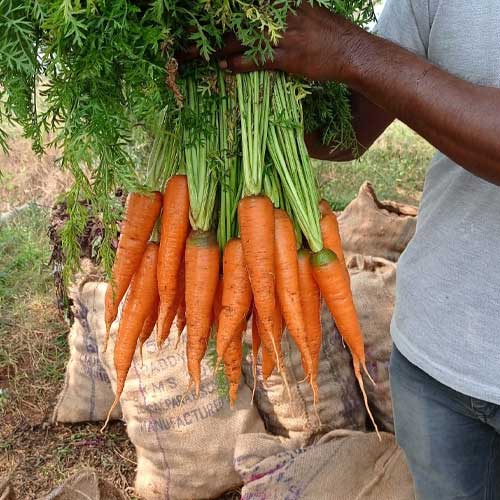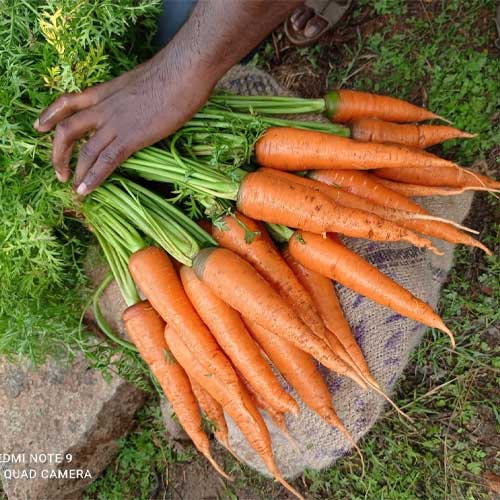Total Number of seeds: 300
Carrot New Kuroda Seeds 🌿🥕✨
Carrot New Kuroda Seeds are known for producing uniform, wedge-shaped roots with broad shoulders and a slightly tapering end. These carrots grow 6-8 inches long with a vibrant bright orange color. This variety thrives between July and December, ensuring a healthy and high-yield harvest. The smooth texture and sweet flavor make New Kuroda carrots perfect for both raw consumption and cooking.
About This Item 🌿
- Type of Seeds: Open Pollinated, Non-Hybrid, Non-GMO
- Germination Time: 7-10 days
- Hours of Sunlight: Needs 6-8 hours of direct sunlight daily
- Where to Grow: Suitable for gardens, raised beds, or pots
- Growing Season: Best sown from July to December
- Seeds Sowing Depth: 1/4 inch deep
- Ideal Climate: Cool weather for root development
- Root Shape: Wedge-shaped, broad shoulders, slightly tapering
- Length: 6-8 inches
- Color: Bright orange
- Days to Maturity: 75-85 days from sowing
- Organic Fertilizer Requirement: Use organic fertilizer every 2-3 weeks
- Life Span: Annual plant
- Ideal Growing Temperature: 18-24°C
- Harvesting Time: Ready to harvest in 75-85 days
- Maintenance Required: Moderate; requires thinning and regular watering
- Watering Frequency: Keep soil consistently moist
- Ideal Grow Bag Size: Use a 12-15 inch deep grow bag for best results


What Size Grow Bag is Best for Carrot New Kuroda Seeds
Growing Season in India 🇮🇳🌞
In India, Carrot New Kuroda Seeds grow best from July to December, taking advantage of cooler weather to develop sweet, healthy roots. This variety is known for its adaptability and uniform growth in diverse climates.
How to Grow in Pots 🪴
- Choose a Pot: Use a pot that is at least 12-15 inches deep.
- Soil Preparation: Use loose, well-draining soil mixed with compost.
- Sowing Depth: Plant seeds 1/4 inch deep and cover lightly with soil.
- Sunlight: Place the pot in a sunny spot with 6-8 hours of sunlight daily.
- Watering: Keep the soil evenly moist but avoid waterlogging.
- Thinning: Once seedlings are 2-3 inches tall, thin them to provide enough space for root development.
- Harvesting: Harvest when roots reach 6-8 inches in length and have a bright orange color.
Seeds Sowing Method 🌾
- Preparation: Use light, sandy soil for the best root growth.
- Sowing: Plant seeds 1/4 inch deep, spaced 1 inch apart in rows.
- Watering: Water immediately after sowing to keep the soil moist.
- Germination: Seeds sprout within 7-10 days.
- Thinning: Thin seedlings to maintain 3-4 inches of space between plants for proper root formation.
Plant Care Tips 🍀
- Sunlight: Needs 6-8 hours of direct sunlight daily.
- Soil: Use loose, well-draining soil to prevent root deformation.
- Fertilization: Apply organic fertilizer every 2-3 weeks.
- Pruning: Remove yellow leaves to keep the plant healthy.
- Pest Control: Monitor for aphids and treat organically if necessary.
- Disease Prevention: Avoid waterlogging to prevent fungal diseases.
How to Fertilize Vegetable Plants Effectively
1. Apply Nutrient-Rich Fertilizers
When your plants begin flowering, use nutrient-rich fertilizers like Organic Bone Meal Powder or Vermicompost. This helps in boosting the bloom and enhances overall yield.
2. Use Organic Fertilizers
Feed your plants with organic fertilizers such as Cow Dung Manure or Neem Cake. Organic options promote healthy soil life.
3. Regular Feeding
Apply fertilizers every 20-25 days to ensure plants receive a steady supply of nutrients. Choose from various options like Cocopeat Compost for moisture retention.
Special Features 🌟
Carrot New Kuroda Seeds stands out for its uniform shape, smooth skin, and vibrant orange color. The roots are sweet and tender, making them ideal for raw salads, juicing, and cooking. This variety is also suitable for distant transportation due to its robust nature.
Benefits/Uses 🍽️
Carrots are rich in beta-carotene, vitamins A and C, and dietary fiber. They are perfect for adding to salads, smoothies, soups, and stews. The roots are also great for juicing due to their high water content.
Precautions While Growing ⚠️
Ensure proper spacing to avoid overcrowding. Monitor watering carefully to prevent root rot. Thin seedlings early to allow sufficient space for root development.
Common Problems Affecting Plants and Solutions 🐛❗
- Pests: Aphids and root-knot nematodes may attack plants. Use neem oil to control pests.
- Diseases: Avoid waterlogging to prevent fungal diseases.
- Root Deformation: Use loose soil to prevent stunted or twisted roots.


Anil K
Good seed quality with a reliable germination rate.
Vinod Iyer
Garden bed me sow kiya aur plant ne achhi tarah se pick up kiya.
Rafiq M
The leaves developed clean and bright with steady progress.
Suma R
The plants stayed sturdy and handled sunlight without any trouble.
Latha
Paudhon me hariyali acchi aayi aur vikas sahi raha.
Sneha
Plants ne early stage me acha response diya, koi issue nahi aaya.
Manoj T
These seeds showed consistent growth from the first week.
Rohit Menon
Overall result accha tha, excited to see growth.
Priya Suresh
Soil me daalte hi sprouts aa gaye, color bright green aaya.
Farida Khan
Growth consistent rahi, carrot tops thode dikhne lage.